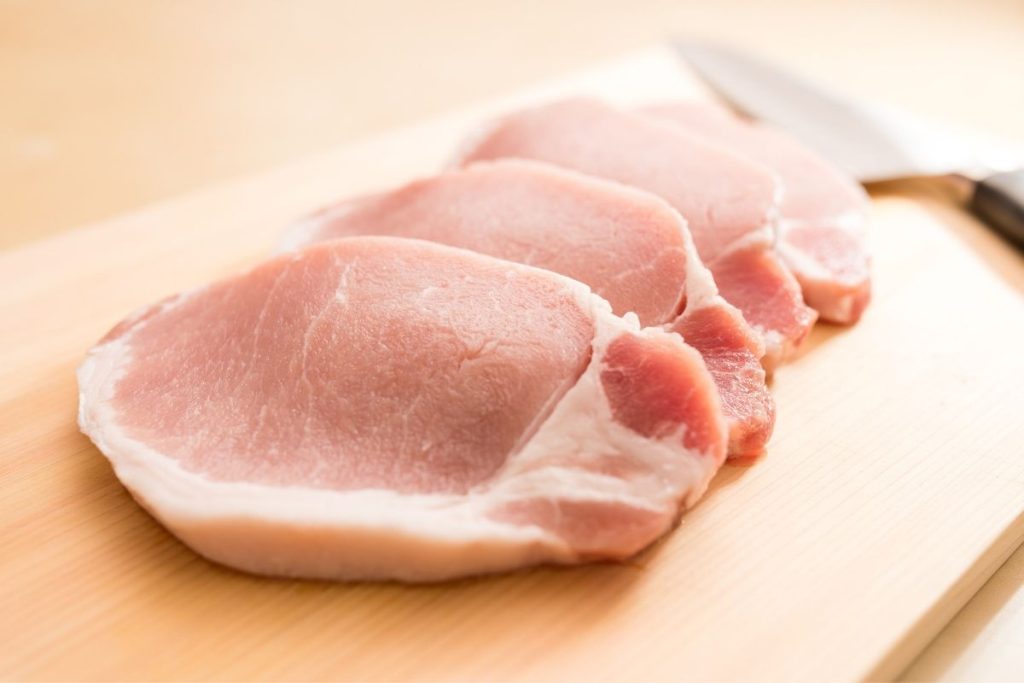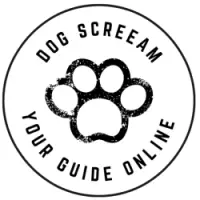The simple answer to the question “Can dogs eat pork?” is Yes! Dogs can definitely eat pork, and it’s super delicious too. Pork meat contains high levels of protein which helps maintain strong muscles and bones. Pork has an alkaline pH level which makes it great for balancing a dog’s stomach acidity, thus preventing indigestion or excessive flatulence. It also aids in the absorption of other nutrients which is a really awesome benefit for dogs, especially those who have food sensitivities or allergies to certain types of meat.

Can a Dog Eat Cooked Pork?
Yes, they certainly can. Pork is safe to be fed even when cooked. However, it’s crucial that the pork should be well done and that there are no remaining traces of pink meat inside because raw pork can contain parasites like tapeworms.
Benefits Of Cooking Pork Before Feeding it To Your Pet
I. Kills Parasites
Even when pork is thoroughly cooked, there’s still a slight chance that some parasites like tapeworms can remain. So if you’re feeding your dog with raw or undercooked pork, make sure to always wash the meat and cook it better next time to kill any potential parasite eggs. Parasites can infest human beings too, so it’s important to practice food safety by cooking pork properly for everyone in the family. When a dog is infected with tapeworms, it can cause stomach upset, digestive problems, and even more serious health conditions. These health conditions may include seizures, fever, loss of coordination, and even death. (ref)
II. Cooked Pork Tastes Great
When cooked, the pork can taste really amazing. It depends on how you cook it, but in general, the pork meat is just so yummy when its well-cooked. Some people even eat bacon almost every day because it tastes so good, and dogs are no different! Dogs also love the great flavor of cooked pork, but please don’t forget to always wash the meat thoroughly before feeding it to your dog.
III. Helps Prevent or Treat Bloat
There are lots of emergency medical conditions that can affect dogs, but bloat is one of the worst because it causes uncomfortable stomach pressure and even leads to death if not treated immediately. When fed with cooked pork, dogs do benefit from its anti-inflammatory properties which may help treat or prevent bloat.
IV. Tenderizes Lean Muscle Meat
Pork meat is usually lean, but the fat that it contains gets melted away when cooked. The tender nature of the pork’s fats makes the meat even softer and tastier to eat for dogs (and humans too). Pork also has a generous amount of collagen that melts into gelatin during the cooking process. Collagen is a valuable source of nutrients, especially for older dogs who start to lose their teeth.
V. Kills Germs
Although cooked pork is always safe to feed, it’s still advisable to cook it first. Pork contains an enzyme called thiaminase which prevents the absorption of thiamin (vitamin B1). Thiamin is essential for a dog’s health because it helps maintain healthy muscles, boosts appetite, and supports a strong immune system. The problem with thiaminase is that it can kill humans if consumed in large amounts, but the amount of thiaminase found in pork meat is not enough to cause problems. So don’t worry about cooking pork first before feeding it to your dog – just do it!
Is Pork a Good Meat For Dogs?
Yes, it is. Pork meat is the #1 ingredient of many commercial dog foods today. Dogs can benefit from pork’s protein content which helps maintain strong muscles and bones. They also love the great flavor of cooked pork but make sure to always wash the meat thoroughly before feeding it to your dog.
Here are 10 Reasons Why Pork Is Not Bad For Dogs
I. Can Boost Immunity
Pigs are naturally resistant to disease, especially when they’re allowed to roam free in pastures or forests. This means that pork contains a generous amount of nutrients that can boost the immune system of your dog. Pork also contains high amounts of Vitamin C which are essential for your dog’s healthy growth and development.
II. Pork is Packed with Nutrients
When fed with cooked pork, dogs can benefit from its high level of B-complex vitamins and other essential nutrients including thiamin, riboflavin, niacin, pantothenic acid, pyridoxine, biotin, and folic acid. Pork can also help maintain healthy skin and coat in dogs because it’s rich in B3 (niacin) and omega-6 fatty acids.
III. Pork Remains Soft Even After Cooking
Pork meat contains collagen which helps make it tender and soft even after being cooked. On the other hand, beef meat tends to be harder to chew after it’s cooked because of its high level of connective tissues. This is why dogs find beef more difficult to eat than pork.
IV. Pork Helps Prevent or Treat Bloat in Dogs
There are lots of emergency medical conditions that can affect dogs, but bloat is one of the worst because it causes uncomfortable stomach pressure and even leads to death if not treated immediately. When fed with cooked pork, dogs do benefit from its anti-inflammatory properties which may help treat or prevent bloat (gastric dilatation-volvulus).
V. Pork Contains Lecithin
Pork contains an enzyme called lecithin which helps with digestion and brain development. It also has a positive impact on the nervous system, cellular membranes, and cholesterol levels in dogs.
VI. Pork Contains Carnitine
Carnitine is a protein-building block that can be found in most red meat including pork. Dogs can benefit from the carnitine found in pork because it promotes a healthy weight and boosts energy levels.
VII. Pork Contains Taurine
Taurine is a nutrient that helps maintain good eye health, heart function, reproduction, and immune system response. Dogs need taurine to survive because they can’t produce it on their own. Pork meat contains lots of taurines, but make sure to pair it with grain-free dog food to avoid deficiencies.
VIII. Pork is Full of Zinc
Zinc is essential for immune system function and normal growth in dogs. Lots of proteins from pork help maintain zinc levels in the body because they’re easy to digest. Just make sure to pair it with other zinc-rich ingredients like eggs or meat.
IX. Pork is Full of Iron
Iron is an essential nutrient that’s responsible for transporting oxygen in the blood and maintaining a healthy immune system. Lots of proteins from pork meat help maintain iron levels in the body because they’re easy to digest, but make sure to pair them with other iron-rich ingredients like spinach or meat.
X. Pork Helps Fight Anemia
Anemia is a type of blood disorder that can affect dogs because they lack an important enzyme called methionine sulfoxide reductase, which helps fight anemia by producing red blood cells in the body. Since pork meat is rich in iron, it helps fight anemia and maintain healthy red blood cells levels.
What Meat Should Dogs Avoid?
Too much fat and pork skin can be bad for dogs because they’re high in calories. Too much fat causes obesity and other health problems in dogs just like it does to humans.
Why Is There No Pork in Dog Food?
Aside from the fact that pork contains high amounts of fat, it’s actually not popular for companies to include pork meat in dog foods because pigs are scavengers and when given a chance; they’ll eat anything including dead animals.
Will Pork Hurt Dogs?
Dogs can eat pork meat if it’s cooked properly and given with other ingredients that can help reduce the risk of raw meat care (like bones, vegetables, etc.). Cooked well, pork is safe for dogs to eat even in small amounts. Just don’t forget to pair it with grain-free dog food to avoid deficiencies.
Here are 5 Precautions to Take When Feeding Pork to Dogs
1. Pork contains lots of fat, but aside from that, it’s low in carbs and sodium which helps with blood pressure and makes you look younger. If given in moderation, pork can be ideal meat for dogs because the high levels of protein help improve their overall health by boosting their metabolism and increasing skin and hair quality.
2. Pork only affects dogs if they’re allergic to it, just like with any other type of meat. If your dog is allergic to pork, the symptoms may include vomiting, diarrhea, and itching on different parts of its body. In this case, take them immediately to a veterinarian for treatment.
3. Just because dogs can eat pork doesn’t mean they can eat it every day. Pork should be given in moderation for dogs just like with humans to avoid harmful side effects. The liver, for example, has lots of Vitamin A that can negatively affect a dog’s health by causing diarrhea and vomiting if given in small amounts.
4. Pork can help fight anemia so make sure to give it to dogs suffering from the disorder. Just make sure you pair pork meat with other ingredients that help fight anemia because too much of anything can be bad for your dog’s health.
5. Dogs shouldn’t eat raw or undercooked pork meat because it contains parasites like Anisakis Tumor Nematodes that can cause intestinal issues or even be life-threatening. Cooked pork meat, on the other hand, is safe for dogs to eat as long as you pair it with grain-free dog food to avoid deficiencies.
As long as you’re careful to avoid raw pork meat, your dogs can eat cooked pork in small amounts just like with any other kind of meat. Make sure you feed them grain-free dog food that’s high in proteins and low in fat to keep obesity at bay while avoiding deficiencies. You can also pair it with other ingredients that help fight anemia and create a balanced diet for your canine without harming them in any way.
